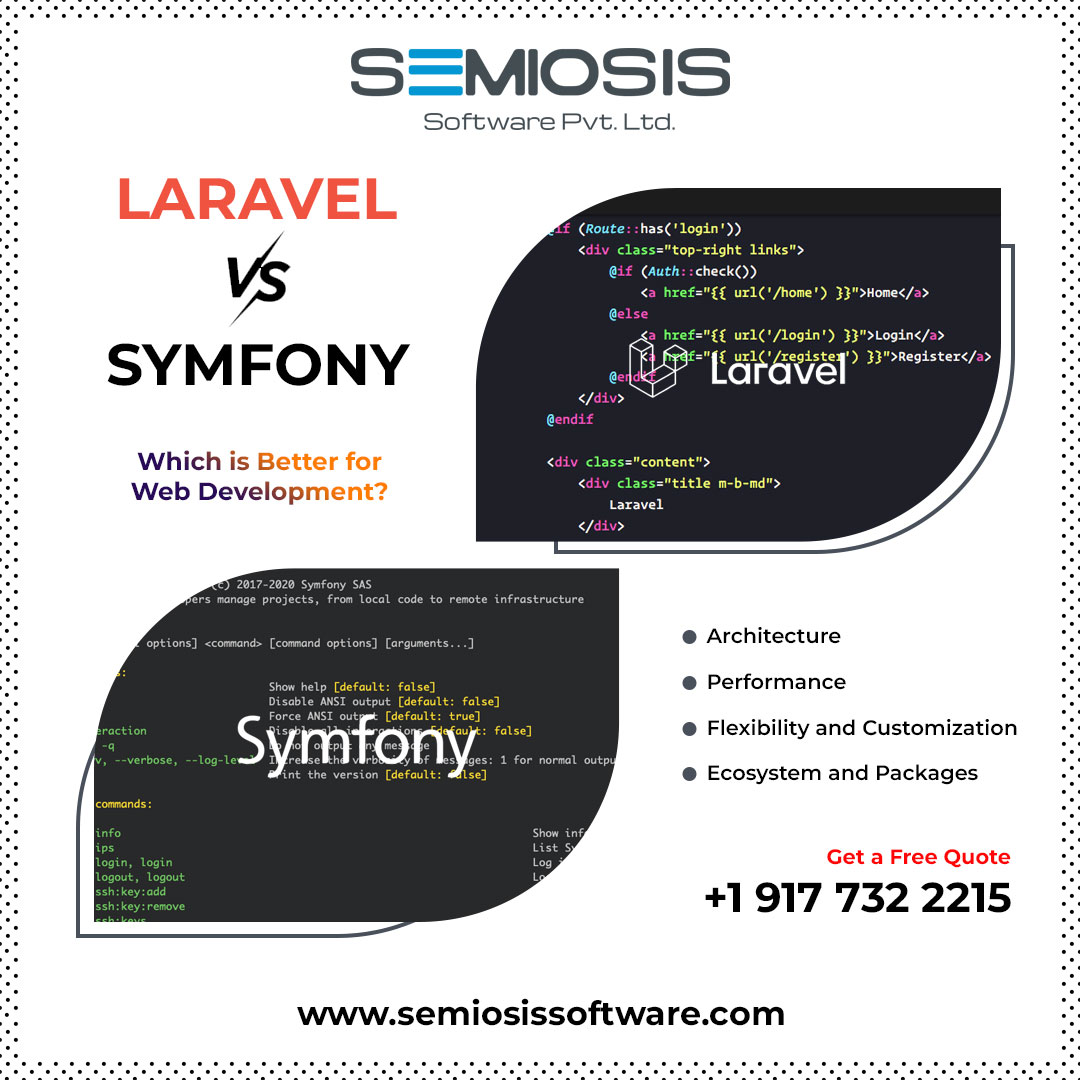Laravel vs Symfony: Which is Better for Web Development?
In the realm of PHP web development, two frameworks stand out prominently: Laravel vs Symfony. Both are robust, feature-rich frameworks that cater to different needs and preferences within the developer community. Choosing between them can be a daunting task, especially for those new to PHP development. In this blog post, we’ll delve into the key differences between Laravel vs Symfony to help you make an informed decision about which framework is better suited for your web development projects.
Understanding Laravel
Laravel, developed by Taylor Otwell, has gained immense popularity in recent years due to its elegant syntax, expressive API, and comprehensive documentation. It follows the MVC (Model-View-Controller) architectural pattern and comes bundled with a wide range of features aimed at speeding up the development process. Laravel’s artisan command-line interface, built-in ORM (Object-Relational Mapping) called Eloquent, powerful routing system, and intuitive templating engine (Blade) are some of its notable features.
Unraveling Symfony
Symfony, on the other hand, is a high-performance PHP framework initially released in 2005. It is known for its stability, flexibility, and modularity, making it a preferred choice for large-scale enterprise projects. Symfony follows a component-based architecture, allowing developers to use only the components they need, thus promoting code reusability and maintainability. Symfony’s robust ecosystem, extensive documentation, and active community make it a reliable framework for building complex web applications.
Feature Comparison
-
Learning Curve: Laravel is often praised for its beginner-friendly nature, thanks to its expressive syntax and intuitive API. On the contrary, Symfony has a steeper learning curve due to its extensive configuration and reliance on dependency injection. However, once mastered, Symfony offers unparalleled flexibility and scalability.
-
Performance: Symfony tends to have a slight edge in performance due to its modular architecture, which allows developers to optimize specific components as needed. However, the performance difference between Laravel vs Symfony is negligible for most applications and can be further optimized through caching and other techniques.
- Ecosystem and Community: Both Laravel vs Symfony boast vibrant communities and extensive ecosystems comprising third-party packages, extensions, and integrations. Laravel’s ecosystem is more tightly integrated, with many packages specifically tailored for Laravel projects. Symfony, on the other hand, benefits from the broader PHP ecosystem and is often preferred for projects requiring interoperability with other frameworks and libraries.
-
Use Cases: Laravel is well-suited for rapid application development, prototyping, and small to medium-sized projects where developer productivity is paramount. Symfony, with its emphasis on modularity and best practices, is preferred for large-scale enterprise applications requiring long-term maintainability, scalability, and performance optimization.
In the Laravel vs Symfony debate, there is no clear winner, as both frameworks excel in different areas and cater to different developer preferences and project requirements. If you prioritize developer productivity, simplicity, and out-of-the-box features, Laravel may be the ideal choice for your web development projects. On the other hand, if you require maximum flexibility, scalability, and performance optimization, Symfony’s modular architecture and extensive customization options make it a compelling option.
Top Rated Laravel Development Company
Semiosis is a top-rated Laravel development company renowned for its expertise and commitment to delivering high-quality web solutions. With a skilled team of Laravel developers, Semiosis excels in crafting robust, scalable, and performance-driven applications tailored to clients’ unique needs. Their proficiency in Laravel’s MVC architecture, coupled with a deep understanding of modern web development practices, ensures the creation of efficient and feature-rich applications. Semiosis emphasizes collaboration, transparency, and client satisfaction throughout the development process, resulting in successful projects that meet business objectives. Trusted by clients globally, Semiosis stands out for its professionalism, reliability, and innovative approach to Laravel development.
Top Rated Symfony Development Company
Semiosis stands out as a premier Symfony development company, celebrated for its unwavering commitment to delivering top-tier web solutions. Bolstered by a team of seasoned Symfony developers, Semiosis specializes in crafting tailored, high-performance applications that precisely meet clients’ needs. Leveraging Symfony’s adaptable architecture and cutting-edge technologies, they ensure the development of scalable, feature-rich solutions. Semiosis places a strong emphasis on collaboration, transparency, and client satisfaction throughout the project journey, culminating in successful outcomes aligned with business objectives. Globally trusted, Semiosis exemplifies professionalism, reliability, and innovation in Symfony development, setting a benchmark for excellence in the industry.
Conclusion – Laravel vs Symfony
Laravel vs Symfony : Ultimately, the best framework for your project depends on factors such as project complexity, team expertise, scalability requirements, and long-term maintenance considerations. Regardless of your choice, both Laravel vs Symfony empower developers to build high-quality web applications efficiently and effectively, ensuring a seamless development experience from start to finish.






